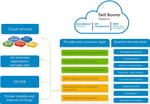In our Part 1, we discussed Dell Boomi as a 100% cloud platform and in this blog we will introduce and discuss IPaas. So what is iPaaS?
What is iPaaS?
Integration platform as a Service (iPaaS) delivers a cloud service for application, data, process, and service-oriented architecture (SOA) integration scenarios. It is a multi-tenant platform that supports cloud-to-cloud, cloud-to-on-premises, on-premises-to-on-premises and B2B integration. It supports real-time integration and scales to meet the high-volume demands of mobile, extract, transform and load (ETL) and electronic data interchange (EDI) environments. Dell Boomi introduced the industry’s first iPaaS in 2008.
- Single-instance, Multi-tenant Architecture
- Enterprise Integration Standards
- Support for Real-Time Integration
- Crowdsourced Intelligence
- Distributed Run-Time Engine
- Easy-to-use, Centralized Management
- Predictable, Affordable Pricing
Single-instance, Multi-tenant Architecture
With an elastic multi-tenant architecture, iPaaS enables multiple tenants (customer organizations) to securely share underlying physical computing resources. The iPaaS provider manages and updates the software and infrastructure, deploying upgrades at regular intervals across the customer base. This eliminates the need for customers to purchase, implement, manage and maintain the underlying hardware and software infrastructure.
Enterprise Integration Standards
iPaaS supports common transport methods and provides universal translation capabilities for non-standard data formats. It also supports a wide variety of enterprise integration scenarios, including B2B, EDI, standards-based web services and industry-specific standards such as HL7 for healthcare.
Support for Real-Time Integration
The prevalence of SaaS applications coupled with explosive data growth often demands real-time information exchange and near real-time, low-latency processing. Having these capabilities included with the iPaaS platform means broader integration requirements are met and minimizes complexity.
Crowdsourced Intelligence
Collecting anonymous platform use data, aggregating it and making it available to the Boomi community reduces the time to configure, test and implement integrations. For example, as you map fields for each integration, a repository captures metadata maps that users can leverage to create new data maps. Integrations built more quickly with fewer errors result in faster time to value.
Distributed Run-Time Engine
Unlike traditional middleware solutions where all integration data passes through a single bus, iPaaS integration development and management occurs in the cloud. Once developed, the integration process can be packaged in a run-time engine, which can be deployed in the cloud or on-premises, to address customer-specific security and latency considerations.
Easy-to-use, Centralized Management
iPaaS solutions also provide an intuitive, web-based console for creating, deploying, monitoring and managing integrations across the enterprise. Customers gain a single, centralized view of all integration processes.
Predictable, Affordable Pricing
Procured as a subscription service, iPaaS offers customers a predictable and manageable expense. Customers purchase only the capabilities and services they need.
How Can iPaaS Benefit Your Organization?
As organizations seek to take advantage of the speed, agility and economics of the cloud, there’s an increasingly critical need to look at integration in a new way. iPaaS is purpose-built to help companies handle the integration requirements of today’s business environment, future-proof their integration solutions and increase the value of their IT investments.
iPaaS customers realize significant, concrete, cost and speed-of-implementation benefits. We invite you to consider how iPaaS can help you derive greater return on investment, faster time-to-value and increased business success.
To be continued . . .
Part 3 will talk about Uniqueness of Dell Boomi.



